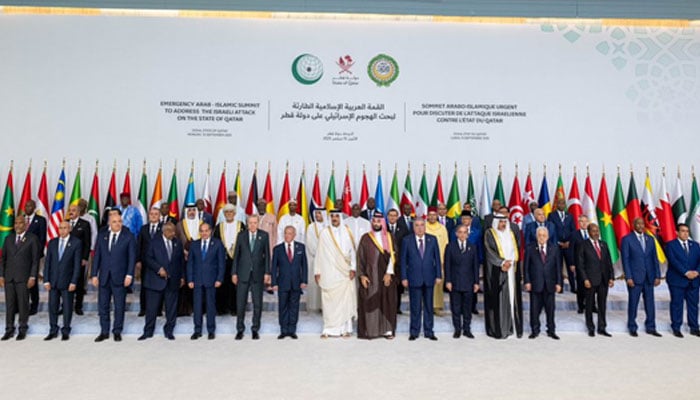Politics
Arab-Islamic summit presses for sanctions, reassessment of relations with Israel

- Leaders condemn Israeli strike on Doha as unlawful attack.
- Israel responsible for genocide, war crimes: summit.
- Leaders call for urgent action to end these practices.
The Arab-Islamic Emergency Summit on Monday called for wide-ranging sanctions on Israel, including an arms embargo and review of economic and diplomatic ties, in response to Tel Aviv’s “flagrant aggression” against Qatar and its ongoing war in Gaza.
Leaders — in the final communiqué issued after the emergency meeting — demanded international accountability, warning that Israel’s repeated crimes and violations of international law pose a direct threat to regional and global peace.
The communiqué urged all states to hold Israel accountable by imposing sanctions, halting the transfer of weapons and military materials, reviewing their relations, and pursuing legal action.
The summit was convened after Israel’s September 9 strike on a residential area in Doha, which targeted housing facilities for mediation delegations, schools, nurseries, and diplomatic missions. The attack caused civilian casualties, including a Qatari martyr, and injuries among residents.
Arab and Islamic leaders condemned the strike in the strongest terms, calling it “cowardly and unlawful.” They said it amounted to a flagrant act of aggression against an Arab and Islamic state and a dangerous escalation that exposes the extremism of the Israeli government.
The communiqué reaffirmed absolute solidarity with Qatar, declaring that aggression against one Arab or Islamic state is an attack on all. Leaders pledged to stand firmly with Qatar in all measures it may take to defend its sovereignty, stability, and the safety of its people.
They warned that Israel’s assault on Qatar, a key mediator in ceasefire talks for Gaza, was also an attack on international peace-making itself. Israel, they said, bore full responsibility for undermining mediation and diplomacy.
The summit said Israel was responsible for genocide, ethnic cleansing, siege, and starvation against Palestinians and termed such actions as war crimes in violation of the Geneva Conventions.
Leaders condemned settlement expansion, forced displacement, and annexation attempts, describing them as crimes against humanity.
They called for urgent international action to end these practices, stressing that silence and inaction had emboldened Israel to persist in its aggressions and perpetuate a policy of impunity.
The leaders reaffirmed support for an independent Palestinian state on the 1967 borders with East Jerusalem as its capital, rejecting any attempt to bypass or undermine the Palestinian cause. They endorsed Jordan’s custodianship of Al-Aqsa Mosque, declaring it a place of worship exclusively for Muslims.
The communiqué also backed the enforcement of International Criminal Court arrest warrants against Israeli officials and compliance with International Court of Justice rulings on genocide prevention in Gaza.
The summit welcomed the “New York Declaration” by the UN General Assembly supporting Palestinian statehood and the upcoming Two-State Solution Conference in New York, co-chaired by Saudi Arabia and France.
It also valued efforts by Arab and Islamic states at the UN Security Council, especially Algeria, Somalia, and Pakistan, for defending the Palestinian cause and convening the emergency session on Israel’s attack against Qatar.
They added that Israel’s aggression against Qatar was not an isolated act but part of a broader campaign that threatens the sovereignty of Arab and Islamic states, undermines international law, and destabilises the region.